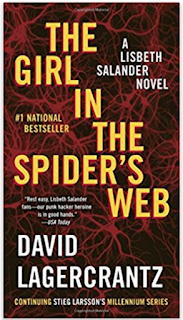I read some critical reviews of certain elements of this book, but hey, not everyone will like everything. For me, sometimes reading is an escape from the world around me. It can be a fantasy world where I don't have to think about too much, be overly critical or sensitive, and can just BE with the words on the page. Sometimes it is an enjoyable place to be, like with this book. Other times it is a not so enjoyable place to be, like with The Angel of History. I am sure there are many people out there who really enjoyed that book, I just don't happen to be one of them.
Like The Martian, Artemis was action packed, not completely predictable, entertaining, and funny. It was thrilling, kept you on the edge of your seat, laughing, anxious, and everything in between. This book is centered around a lady named Jazz who was born on and lives on the Moon. Yes, THE MOON. In this book, there is a colony on the moon, built by the country of Kenya. Jazz may be in to some shady and not so shady stuff, but she's got the spotlight in the book.
Apparently on the Moon, like everywhere, there is an underground element, there are mafia people, rich people, poor people, and people who think they can get away with anything. Jazz finds herself in the middle of all of this along with a random set of people who help and hinder her along the way. Of course there are a few twists and turns along the way, and a lesson in economics.
"The next big step is taxes."
"Taxes?" I snorted [Jazz]. "People come here because they don't want to pay taxes."
"They already pay taxes - as rent to KSC [Kenyan Space Agency]. We need to change over to a property-ownership and tax model so the city's wealth is directly tied to the economy. But that's not for a while."
She took off her glasses. "It's all part of the life-cycle of an economy. First it's lawless capitalism until that starts to impede growth. Next comes regulation, law enforcement, and taxes. After that: public benefits and entitlements. Then, finally, over-expenditure and collapse."
"Wait. Collapse?"
"Yes, collapse. An economy is a living thing. It's born full of vitality and dies once it's rigid and worn out. Then, through necessity, people break into smaller economic groups and the cycle begins anew, but with more economies. Baby economies, like Artemis is right now."
"Huh," I said. "And if you want to make babies, somebody's got to get fucked."
She laughed. "You and I will get along just fine, Jasmine."
I left without further comment. I didn't want to spend any more time inside the mind of an economist. It was dark and disturbing. I needed a beer.
And you have all of this set on the Moon (so there is sort of some science-y stuff in the book too)! With cussing!!!
This is an entertaining story, fast-paced and interesting. Two thumbs up from me. Look forward to the movie!











